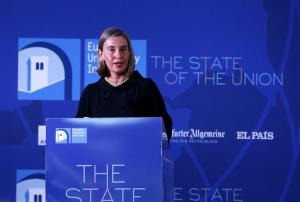The foreign ministers of France, Germany and the United Kingdom (EU3) and EU’s foreign policy chief Federica Mogherini will meet Iran’s foreign minister Mohammad Javad Zarif on Tuesday in Brussels to discuss how to keep the nuclear deal after the US withdrawal from the deal and the possibility of US sanctions against companies doing business with Iran. While the EU3 stated last week in a joint statement that EU “must also address in a meaningful way shared concerns about Iran’s ballistic missile programme and its destabilising regional activities” in the region, the European External Action Service (EEAS) as represented by Mogherini has largely been silent on these issues.
At today’s press briefing the spokesperson for EEAS repeated that EU is sticking to the nuclear deal - which she said is working and respected by Iran - but did not give any details about the issues which would be discussed with Iran.
The EU chief spokesperson referred to Mogherini’s remarks last week (8 May) but contrary to the EU3 statement Mogherini did not mention the issues of concern outside the nuclear deal. Mogherini gave also a state of union address last Friday (11 May) at the European University Institute in Florence without referring at all to the nuclear deal.
On Wednesday the college of commissioners will discuss the deal and in the evening the EU leaders will discuss it at a dinner in Sofia, Bulgaria, ahead of the Western Balkans summit there the following day. “I cannot anticipate those meetings,” the spokesperson said. “We don’t start negotiations in the press room.”
Asked by The Brussels Times about any differences of opinion between the EU3 and EEAS, the spokesperson for EEAS replied that “there is absolutely no disconnect” between them on the issues outside the nuclear deal. “There are issues of concern,” she said without specifying them, “and they are addressed.”
When and how they were addressed by EU is unclear. Iran refuses to negotiate on the other issues and they were hardly addressed in the period leading up to the US withdrawal from the nuclear deal, unless Mogherini conducted a form of silent diplomacy with Iran.
Since the deal was signed in 2015, Iran has further developed its missiles, which now can reach targets in Europe, and supported the Assad regime to brutally crush the rebellion in Syria. The war is over in Syria but Iran is building military bases there from which it can threaten Israel.
M. Apelblat
The Brussels Times

